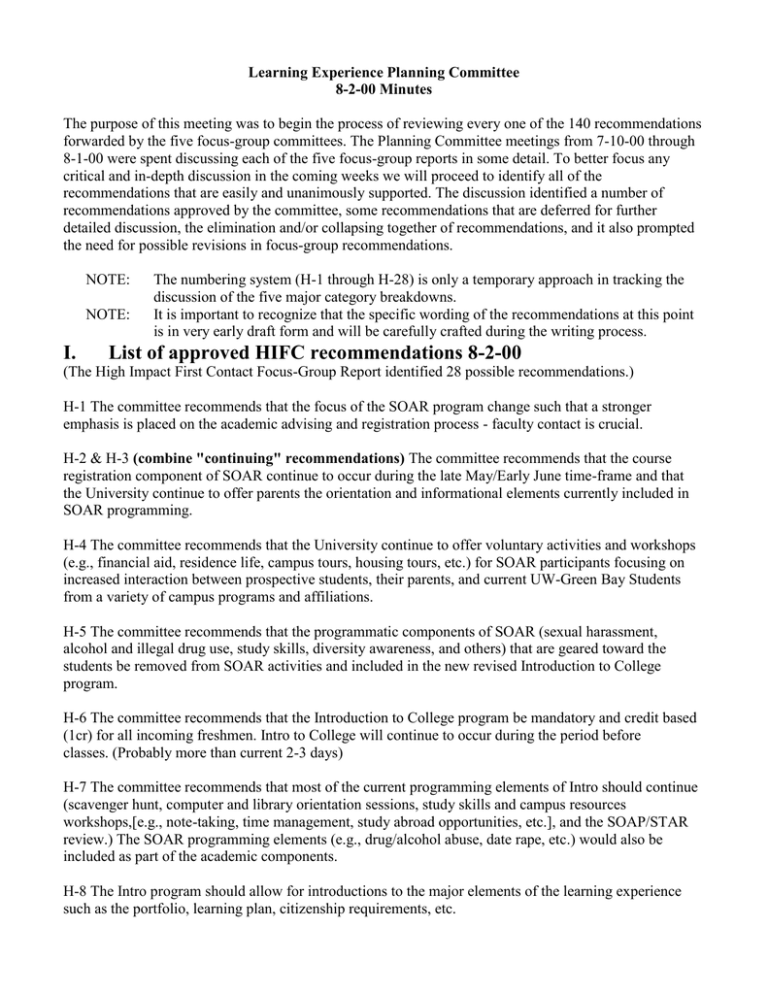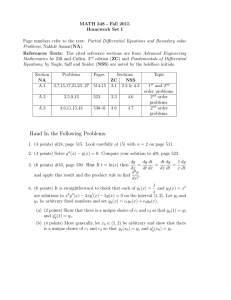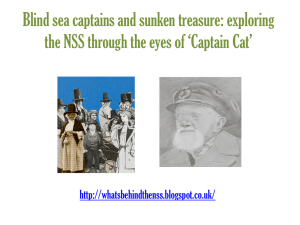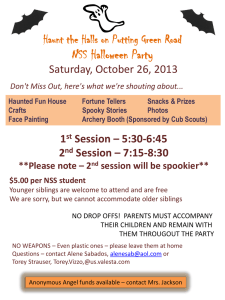8/2/2000
advertisement

Learning Experience Planning Committee 8-2-00 Minutes The purpose of this meeting was to begin the process of reviewing every one of the 140 recommendations forwarded by the five focus-group committees. The Planning Committee meetings from 7-10-00 through 8-1-00 were spent discussing each of the five focus-group reports in some detail. To better focus any critical and in-depth discussion in the coming weeks we will proceed to identify all of the recommendations that are easily and unanimously supported. The discussion identified a number of recommendations approved by the committee, some recommendations that are deferred for further detailed discussion, the elimination and/or collapsing together of recommendations, and it also prompted the need for possible revisions in focus-group recommendations. NOTE: NOTE: I. The numbering system (H-1 through H-28) is only a temporary approach in tracking the discussion of the five major category breakdowns. It is important to recognize that the specific wording of the recommendations at this point is in very early draft form and will be carefully crafted during the writing process. List of approved HIFC recommendations 8-2-00 (The High Impact First Contact Focus-Group Report identified 28 possible recommendations.) H-1 The committee recommends that the focus of the SOAR program change such that a stronger emphasis is placed on the academic advising and registration process - faculty contact is crucial. H-2 & H-3 (combine "continuing" recommendations) The committee recommends that the course registration component of SOAR continue to occur during the late May/Early June time-frame and that the University continue to offer parents the orientation and informational elements currently included in SOAR programming. H-4 The committee recommends that the University continue to offer voluntary activities and workshops (e.g., financial aid, residence life, campus tours, housing tours, etc.) for SOAR participants focusing on increased interaction between prospective students, their parents, and current UW-Green Bay Students from a variety of campus programs and affiliations. H-5 The committee recommends that the programmatic components of SOAR (sexual harassment, alcohol and illegal drug use, study skills, diversity awareness, and others) that are geared toward the students be removed from SOAR activities and included in the new revised Introduction to College program. H-6 The committee recommends that the Introduction to College program be mandatory and credit based (1cr) for all incoming freshmen. Intro to College will continue to occur during the period before classes. (Probably more than current 2-3 days) H-7 The committee recommends that most of the current programming elements of Intro should continue (scavenger hunt, computer and library orientation sessions, study skills and campus resources workshops,[e.g., note-taking, time management, study abroad opportunities, etc.], and the SOAP/STAR review.) The SOAR programming elements (e.g., drug/alcohol abuse, date rape, etc.) would also be included as part of the academic components. H-8 The Intro program should allow for introductions to the major elements of the learning experience such as the portfolio, learning plan, citizenship requirements, etc. H-9 DEFERRED H-10 The committee believes that social programs should continue to play a major role in the Intro programs. H-11 During the Intro week, students will also have the opportunity to meet their faculty advisor again to confirm their schedules and make any changes they feel are necessary. Committee Recommendations H-12 The HIFC Committee recommends that the New Student Seminar (heretofore NSS) be directly linked with the Intro to College groups. In other words, the same "class" from Intro would become the NSS class. H-13 The Committee recommends that the Intro to College program should be assigned one (1) credit, by coupling Intro to College with the NSS, there are some administrative benefits of making the NSS a two (2) credit course. H-14 The HIFC Committee recommends that the NSS course be content-based in order to be most effective and engaging for both the students and the faculty members involved in the course. H-15 DEFERRED (Possible coupling with H-17 & further discussion of NSS structure) H-16 The Committee supports the creation of a course proposal system to screen seminar proposals prior to official AAC Faculty Governance Approval. H-17 DEFERRED (Possible coupling with H-15) H-18 The course needs to be taught as a small seminar class (20 students) to encourage discussion and communication. The peer leaders (see below) should be actively engaged in the classroom discussions and also outside the classroom. engaging learning environment. H-19 & H-20 (combine recommendations) The HIFC Committee recommends that all seminar instructors involved in teaching the NSS go through an established faculty development session that explicitly addresses issues and topics discussed above and also supports the active involvement of peer leaders and/or other students in the instructor training program. H-21 The Committee recommends that a resource library should be established to keep files of all the courses taught along with the various materials used by the faculty during the courses. H-22 DEFERRED H-23 & H-27 & H-28 (combine recommendations) The HIFC specifically recommends that the peer leaders (successful & active students [sophomore to senior] that would be recruited to participate in the high impact/first contact initiatives) be utilized as collaborators for the NSS. The Committee further recommends that the Peer Leaders lead groups of new students during the Introduction to College program and serve as "Collaborators" in the Freshmen Seminars, assisting the instructors with teaching the class. Peer Leaders can offer advice and counsel in a number of areas. The Committee further recommends that the University provide certain incentives and rewards for students to participate in the Peer Leader program. These could include monetary compensation, fulfillment of the citizenship requirement or independent study/internship credit. Ideally, individual students could be At a minimum, the Peer Leaders would: Provide an opportunity to meet with students once per week during the first semester and once per month in the second semester Help students with development of their learning plan & portfolio Work with students at the Introduction to College program. Suggest formats for structured and unstructured contact Work with the faculty member(s) in the New Student Seminar H-24 (DEFERRED) H-25 The Committee supports the idea of qualified lecturers or academic staff as seminar instructors, as long as the same course submission and review process is followed to ensure academic integrity. The process must also assure the approval of the additional work assignment by the appropriate supervisor(s). The Committee supports the idea of having academic staff co-teach with a faculty member as a way of introducing students to other people around campus and bringing their expertise into the class. H-26 (Recommendation Not Approved) II. List of Recommendations Not Approved 8-2-00 H-26 (Recommendation Not Approved) The Committee recommends that the Peer Orientation groups be the same as the Seminar class. The peer groups will then have established relationships. It will be up to the Peer Leader to schedule and organize additional meetings outside of the Seminar class and into the next semester. Participation in these meetings will be highly encouraged but will be voluntary. III. Detail Discussion Items Identified 8-2-00 General Education Courses and New Student Seminar New Student Seminar and System Dynamics Approach IV. List of Recommendations Deferred for Discussions 8-2-00 H-9 DEFERRED The committee recommends that an Intro to College for transfer students be developed, and that attendance at it be made mandatory for all transfer students but probably not credit-based. (Note possible combining H-17 & H-15) H-17 DEFERRED The HIFC Committee agreed that one of the major goals of the NSS should be to ensure an engaging learning setting. (increased socialization among students and between students and faculty, for example). H-15 DEFERRED The Committee recommends that seminars be designed around the following seven curricular objectives: Critical thinking/problem solving: This is consistent with the institution's educational philosophy as outlined in the Green Bay Idea of an Educated Person. Communication Skills - Effective communication skills including writing, oral, and the ability to work in a team or small group environment. Creativity/innovation – Students should be expected to have the ability to come up with new ideas or ways of presenting their ideas or beliefs. Exploring underlying value systems - Through readings, discussions, and writing, it is the intent of this objective is help students realize that differences in beliefs and opinions are typically not an issue of "I'm right, and your wrong", but rather originate from different perspectives based on how information is being filtered through one's own set of beliefs and values. Learning Plan/Portfolio - The NSS is the ideal place for the student to begin the process of developing the Learning Plan that will shape their UW-Green Bay education. Information Literacy Standards - The Association of College & Research Libraries ( http://www.ala.org/acrl/ilstandardlo.html), recognizes five standards that make up an information literate student. The information literate student: determines the nature and extent of the information needed accesses needed information effectively and efficiently evaluates information and its sources critically and incorporates selected information into his or her knowledge base and value system individually or as a member of a group uses information effectively to accomplish a specific purpose understands many of the economic, legal, and social issues surrounding the use of information and accesses and use information ethically and legally. Ongoing Self-Reflection - the Committee feels that fostering the habit of on-going self-reflection should be a fundamental objective of the NSS. The Learning Plan and Portfolio requirement in the Task Force Report are obvious products of this type of thinking. The skills that lead to self-reflective thinking and learning should be purposefully cultivated in the NSS. It would not be expected that this course would lead to student mastery of these areas. Rather, the intent would be to introduce students to intellectually rigorous, engaging content and provide them with learning experiences that will help them to practice and refine these skills. H-22 DEFERRED The HIFC Committee recommends that the faculty teaching the NSS be the faculty advisor for the students in the seminar for at least their first year at UW-Green Bay. While it is true that not all NSS faculty instructors/advisors will be able to advise on specific issues of all majors, the faculty advisor will have knowledge of who to contact with regard to program-specific questions or issues. H-24 (DEFERRED) In most cases transfer students will need to be evaluated individually to determine whether they should be required or encouraged to take the NSS. For those transfers who are not required or recommended for the NSS, the University should provide information in some alternative format (print, electronic or via presentations to individual or small groups) on the ideas of the Student Learning Experience. This will ensure that transfer students are aware of the student learning experience requirements (e.g., portfolio, citizenship, etc.).


